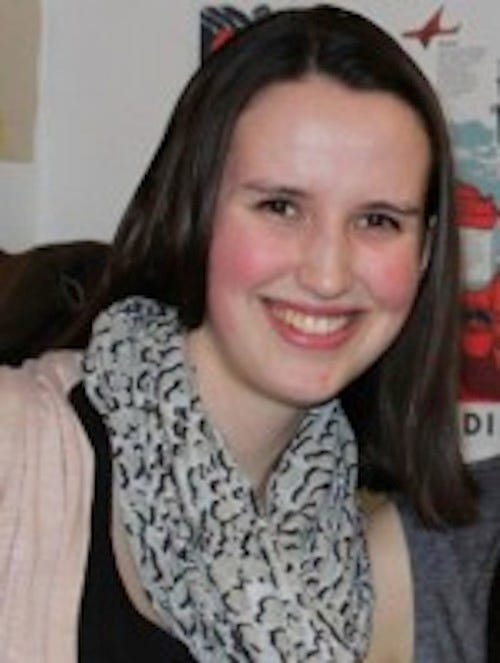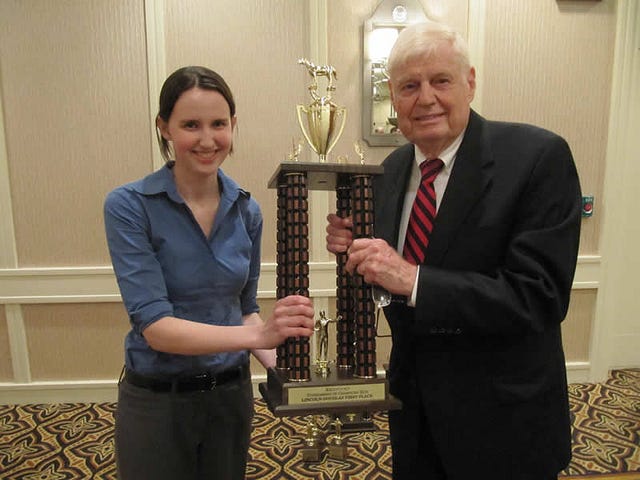VBI Family: Interview with Catherine Tarsney


Catherine Tarsney is a senior at the University of Chicago, where she is majoring in Public Policy. She is currently a seasonal associate at 270 Strategies, and has worked as a Neighborhood Team Leader and Fall Fellow for Obama for America. She graduated from St. Louis Park HIgh School in 2010, where she qualified four times to the TOC, won it as a senior, and was the champion of multiple national circuit tournament. She is currently an assistant coach at the Hockaday School in Texas. She attended VBI as a student before her sophomore, junior, and senior years, and has taught at VBI as an instructor every summer since then.
You broke debate records by qualifying for the TOC four years in a row! How did you achieve such a high level of success so early on?
I think the biggest thing was that I had a great group of teammates and a coach who really pushed me early on. I had the opportunity to work and practice with some really incredible debaters, which gave me opportunities to keep improving my skills against people who were much better than me. It also made a huge difference that I was never treated any differently on my team for having started in junior high – I was immediately competing against high school students, and never felt like I was in a separate category as a result of being younger, which providing lots of opportunities to grow and improve.
How did it feel when you capped off your senior year with a TOC win?
It was definitely amazing. In one sense, TOC is just another tournament, and I’m confident that I would have been happy with my accomplishments no matter how that one weekend ended up. But in another sense, TOC had always been the thing I’d been working toward, and so that win really felt like the perfect culmination of the previous six years.
Tell us about your work at 270 Strategies! Do you think skills you've learned from debate carry over into your work?
270 Strategies is a political consulting firm that works with clients to build data-driven grassroots organizations and digital programs to achieve their strategic goals. I’ve gotten to work on the 270 grassroots organizing team since last April. It’s been a really extraordinary experience all around, and particularly in that it has given me the chance to work on a wide range of campaigns – both advocacy and electoral – where we can take on issues that really matter and see the tangible impact our work is having.
Debate definitely has prepared me for this sort of work more than anything else I’ve done in high school or college. Debate teaches you to be strategic, to defend you beliefs and to question them, and generally to think critically. Those skills have shaped the way I think about pretty much everything, but they’ve been particularly useful in this work context. A lot of what we do is really quite similar to the way you’d think about constructing an advocacy on a topic – there’s some problem in the world; your job is figuring out the best way to solve it. Debate also taught me that there tends not to be one simple solution to any of these problems, and that creative thinking and an ability to adapt to new situations (new arguments, etc.) are critically important.
Finally, debate has given me a whole set of concrete skills that I benefit from every day at work. It taught me how to write cogently and persuasively. And maybe most significantly, it taught me to research – that’s probably the thing I notice the most. The research requirements of the activity, both in terms of extensive scope and short deadlines, have served me really well and made me much more efficient at researching or learning about any new topic that comes up in my work.
What was it like organizing the volunteer team at the University of Chicago for Obama's reelection campaign?
Being involved in the 2012 campaign was an incredible experience. Playing a role in a national campaign really makes you feel like you’re part of something so much bigger than yourself, and it provides an opportunity to meet and work alongside amazing people who are passionate about the same things you are. Organizing in Chicago for a presidential election is strange in some ways – mainly in that you know your state isn’t competitive, so we were focused on growing a volunteer base that could reach out into our neighboring states of Iowa and Wisconsin – but in this election it was also a really special experience, since the University of Chicago is really in President Obama’s backyard. I had the chance not only to organize fellow student volunteers, but also to work alongside many amazing volunteers from our larger community, many of who have a unique sort of enthusiasm born out of their experience volunteering on the President’s behalf since he was campaigning to be an Illinois State Senator.
Overall, I’ve found political work to be the place where I can best apply both the skills and the competitive drive of the debate activity; at a basic level, it’s about developing strong defenses of your beliefs, about convincing others of them, and then about motivating them to act. And there’s not much better than watching election results come in and seeing the months (and years) of hard work by people all around the country – the work you’ve gotten to be some small part of – paying off.
What is your favorite experience from VBI as a student?
In terms of real debate learning, my favorite experience was probably discussions we had – in a formal series one year, and in casual discussions other years – about the evolution of thinking, paradigms, etc. in the debate activity. Getting a historical perspective of our activity was really valuable in making me think more critically about the things we take for granted and about what elements of the activity are or aren’t inevitable; it also made me think about where we might be going as a community and how to influence that process of change.
Overall though, my absolute favorite experience was probably pub quiz.
You've taught the top lab at VBI for several years- what are some of your favorite memories as an instructor?
Teaching at VBI is amazing mainly because of the students I’ve gotten to work with; watching debaters improve in demonstrable ways and seeing them learn from each other throughout camp always feels really rewarding (and I do think that the community that grew out of the #TNT lab of 2012 was something really special).
The thing that stands out in my experience though is the opportunity I had last summer to work with a wide range of students. During our first focus week, I led a sort of crash-course week for novices, and then during our main session I taught top lab. Both groups of kids were awesome to work with, and it let me see and work with debaters who were all growing and developing throughout camp, but were coming from very different places; I saw some of the debaters who are consistently winning major tournaments this year take some significant steps forward, and I also saw debaters getting the hang of the activity for the first time. Working with students to learn some of the fundamentals of research, argument construction, and public speaking was really great in that I think the improvements made in those early stages are some of the strongest reminders of how valuable debate can be.
If you could give one piece of advice to young debaters, what would it be?
More than anything – don’t be afraid to mess up. I actually think I held myself back a lot in my first few years competing, because I was worried about failing publicly, and so I was a lot less willing than I should have been to take risks and try new things. In the end though, it’s those risks, and that willingness to experiment, that leads to the most concrete improvement. So you should be okay with looking stupid in front of your coaches, judges, and opponents (I think this is true everywhere, but it’s especially true at camp, which should be a completely safe place to take risks, mess up, and improve as a result). The rounds in which you get destroyed tend to be the ones you learn the most from.




